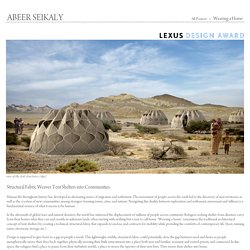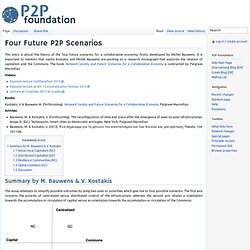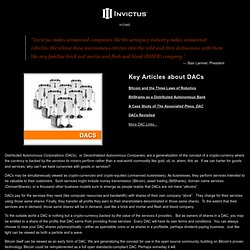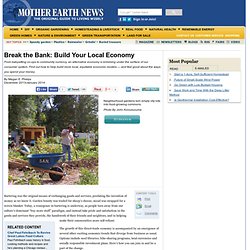

Nomads. Common tools. Housing. ABEER SEIKALY. Human life throughout history has developed in alternating waves of migration and settlement.

The movement of people across the earth led to the discovery of new territories as well as the creation of new communities among strangers forming towns, cities, and nations. Navigating this duality between exploration and settlement, movement and stillness is a fundamental essence of what it means to be human. In the aftermath of global wars and natural disasters, the world has witnessed the displacement of millions of people across continents. Refugees seeking shelter from disasters carry from their homes what they can and resettle in unknown lands, often starting with nothing but a tent to call home. “Weaving a home” reexamines the traditional architectural concept of tent shelters by creating a technical, structural fabric that expands to enclose and contracts for mobility while providing the comforts of contemporary life (heat, running water, electricity, storage, etc.)
Food. Four Future P2P Scenarios. This entry is about the theory of the four future scenarios for a collaborative economy, firstly developed by Michel Bauwens.

It is important to mention that Vasilis Kostakis and Michel Bauwens are working on a research monograph that explores the relation of capitalism and the Commons. The book Network Society and Future Scenarios for a Collaborative Economy is contracted by Palgrave Macmillan. Videos: Books: Kostakis, V. & Bauwens M. Articles: Bauwens, M. & Kostakis, V. This essay attempts to simplify possible outcomes by using two axes or polarities which give rise to four possible scenarios. Netarchical Capitalism (NC) We define as “netarchical capitalism” the first combination (upper-left) which matches centralized control of a distributed infrastructure with an orientation towards the accumulation of capital. Distributed Capitalism (DC) The second combination, (bottom-left) called “distributed capitalism”, matches distributed control but with a remaining focus on capital accumulation.
P2P Foundation. Welcome to the Community Exchange System. Appropedia. 01/Micromachins-Damien_Antoni_Lydia_Blasco_architectes.pdf. DACs — Invictus Innovations Incorporated. Distributed Autonomous Corporations (DACs), or Decentralized Autonomous Companies, are a generalization of the concept of a crypto-currency where the currency is backed by the services its miners perform rather than a real-world commodity like gold, oil, or, ahem, thin air.

If we can barter for goods and services, why can’t we back currencies with goods or services? DACs may be simultaneously viewed as crypto-currencies and crypto-equities (unmanned businesses). As businesses, they perform services intended to be valuable to their customers. Such services might include money transmission (Bitcoin), asset trading (BitShares), domain name services (DomainShares), or a thousand other business models sure to emerge as people realize that DACs are not mere “altcoins”.
DACs pay for the services they need (like computer resources and bandwidth) with shares of their own company “stock”. To the outside world a DAC is nothing but a crypto-currency backed by the value of the services it provides. BitShares Forum - Index. Break the Bank: Build Your Local Economy - Natural Health. Bartering was the original means of exchanging goods and services, predating the invention of money as we know it.

Garden bounty was traded for sheep’s cheese; mead was swapped for a woven blanket. Today, a resurgence in bartering is underway, as people turn away from our culture’s dominant “buy more stuff” paradigm, and instead take pride and satisfaction in the goods and services they provide, the handiwork of their friends and neighbors, and in helping make their communities more self-reliant.
The growth of this direct-trade economy is accompanied by an emergence of several other exciting economic trends that diverge from business as usual. Options include seed libraries, bike-sharing programs, local currencies and socially responsible investment plans. Here’s how you can join in and be a part of the change. Self-Reliance Through DIY Projects Barter and Trade For What You Need.